A mob of Trump supporters stormed the Capitol on Wednesday, leaving at least five people dead and marking a brutal end to a presidency that ended just as it began. That is, taken out of chaos.
Trump established himself through populism and is leaving the same way. Many said the motley crowd that stormed the Capitol did not represent the average supporter of the outgoing Republican President, but the whole event highlighted a great truth. That the US has derailed into an era of intense polarization, with Biden being elected President precisely because there was a massive rally to the opposite pole, so that we don't have a Trump re-election. However, the basis of the political debate is now taking place in extreme conditions, with aggressive rhetoric, and the outgoing President himself is largely responsible for this, as well as the lack of a solid political discourse.
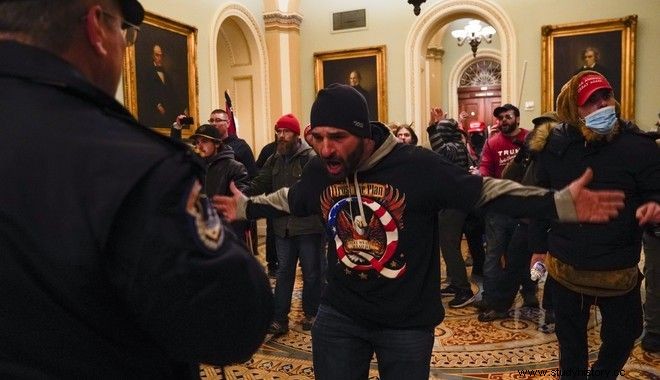
Of course, this is not the first time in US history that the Capitol has been targeted by warring, opposition forces, despite the fact that it symbolizes the infamous "American Republic", which of course has from time to time made sure to instigate coups in other democracies around the world. planet.
The Capitol itself was built by African Americans in 1793, under the presidency of George Washington. The first session was held in 1800, the year the seat of the Federal government was moved from Philadelphia to Washington.
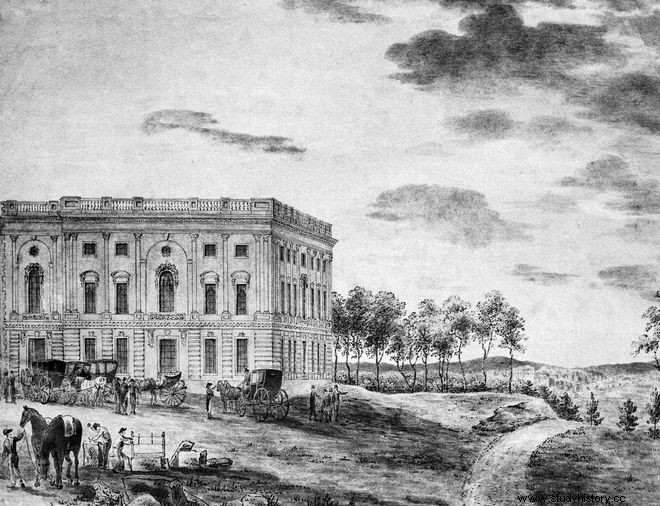
The construction of the Capitol continued until the War of 1812. A year after the start of the war between the United States and Great Britain, American troops burned colonial buildings in Canada. In retaliation, the British burned buildings in Washington, including the Capitol. The building brought great destruction to such an extent that the transfer of the headquarters, back to Philadelphia or to another, distant State, was considered. However, for reasons of symbolism, it was decided to rebuild a Capitol which would now number over 600 rooms.
The American period of unrest continued with the Civil War. One of the most famous incidents of violence in Congress is the attack on Charles Sumner.
In 1856, pro-slavery Congressman Preston Brooks attacked the anti-slavery Charles Sumner inside the Capitol. Brooks hit Summer with a cane, since as he had stated at the time, he could not challenge him to a duel since the "institution" had been abolished by law. Historian Joanne B. Freeman has documented at least 70 incidents of violence among members of Congress.
In 1858 we had a regular "battle" in Congress, when at least 30 members were caught red-handed, while in 1860 a Southern congressman threatened his political opponents with a pistol.
When Abraham Lincoln won the presidency in 1860, the southern states responded with armed struggle. During the Civil War, the Confederate army never managed to capture the US administrative capital.
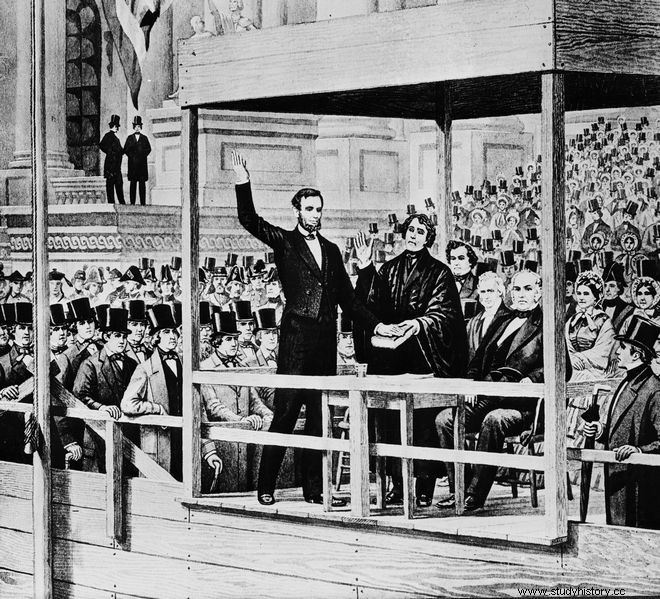
In addition to the above, there have been terrorist armed attacks against the Capitol from time to time. In 1954, four Puerto Ricans shot and wounded five members of Congress, declaring that they were demanding independence for their country. President Jimmy Carter commuted the sentence of one perpetrator and pardoned the other three in 1979.
On March 1, 1971, a bomb exploded in the Capitol building. While the bomb did not injure anyone, it caused about $300,000 in damage. The Weather Underground organization had claimed responsibility protesting the US bombing of Laos.
On November 7, 1983, a bomb exploded on the second floor of the Senate wing of the Capitol. The device detonated late at night and no one was injured, but it caused about $250,000 in damage. The action was taken in retaliation for US involvement in the politics of Lebanon and Grenada.
We had shootings in 1890 after a reporter got into an argument with a member of Congress, in 1998 when a man shot and killed two security men, and in 2016 when police officers fired on a man who tried to attack the Capitol perimeter with a gun.
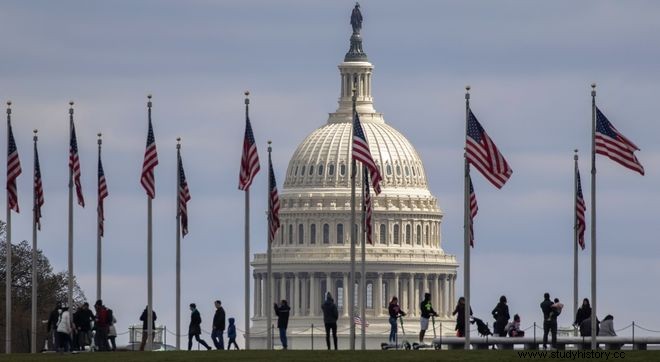
And now what?
After the recent incidents of violence, many are wondering if the "Biden era" and Kamala Harris will be able to defuse the polarized climate. Since the "number 2" of the Republicans is Kevin McCarthy, the hopes in this direction are scissored. Kevin McCarthy is a hard-line spokesman for "Trump politics" and the doctrine of American supremacy, and has vehemently supported the allegations of fraud from the start, never changing course. After the recent events he tried to calm the whole atmosphere, talking about "Republicans' responsibility", and condemning the violence. In fact, Trump's first speech was made after his own intervention. However, until a few hours before the orchestrated attack, it was maintained that there was a "real theft" in the elections.
As Berlin's Tageszeitung wrote:"Since the end of the Bush era at the latest, the Republican Party has been radicalizing at great speed. At every party convention, an ever more extreme candidate, or candidate, with ever greater delusions comes to the fore. Even after Tuesday's attack, not all Republican members of Congress were ready to accept the Democratic nomination of Joe Biden."
Or as the also German Der Standard wrote:"Trump's attack on the Republic failed, because its brain was occupied only by emotions and lacked strategic thinking. But a more intelligent demagogue could have used the forces that brought this country to ruin, very more effectively'.
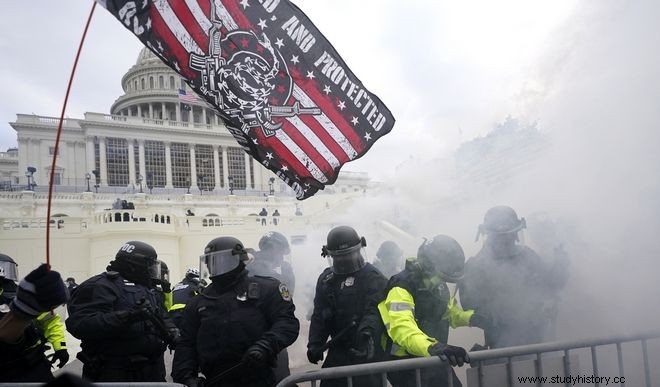
In any case, the Republicans will try to (let's use the term) "defraud" the party, but the damage is done. For the past four years, they have inoculated a large part of their electorate with racist rhetoric, with fictions of American superiority and with the legitimization of aggression in every manifestation of public life, setting against them every democratic achievement and every rational argument. Conspiracy, chauvinism, fake news, have penetrated as never before in the American Republican camp, and a communication campaign of many years, strengthened during the years of the Obama presidency, is responsible for this.
It goes without saying that exactly this policy of "Trumpism" has found ardent supporters in other corners of the globe, with democratic freedoms and social and labor rights "bleeding" from Brazil to Poland, and from Hungary to Belarus . What we are seeing on a global scale is a gradual erosion of confidence in democracy as the effective political system to deliver social justice, and the US does not have its hands "clean" in this area. Systemic impasses are "solved" or, if you like, healed with political talk of the pavement, with non-existent solutions and unworkable proposals, which reinforce the weakening of the world's trust in the authorities and the electoral processes.
The change in the US happened with the re-election of the Democrats. It remains to be seen if we will also have substantial political interventions in the field of "real life", which could provide a way out of the chaos, which -always- also has geopolitical ramifications.
Read them News from Greece and the world, with the reliability and validity of News247.gr.
